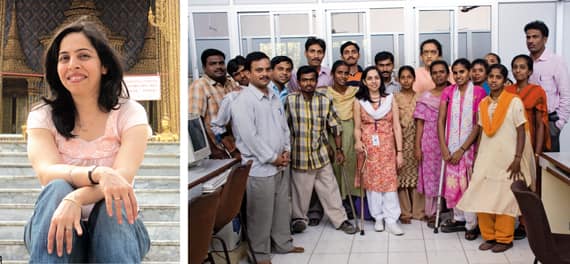Meenu Bhambani: A polio victim's quest for mobility
"Till class 9, I was topping from the bottom," says Meenu. | As Global Head of CSR, MPHASIS, today, Meenu has paved the way for the hiring of differently-abled persons across verticals. |
MEENU'S ride to school was unique. From Sindhi Colony her mother cycled down bumpy lanes to drop her off to Little Flowers School, a primary school at Banikpur (Jaipur). She still cherishes the ride on the bicycle. With meagre earnings, her father managed to pool money for education and rehabilitation. He drew a loan of Rs. 30 to pay her school fees!
Since they lived in a patriarchal joint family ambience, her parents were accustomed to nasty taunts from relatives like “Why are you admitting her to English medium or any fancy school which is so expensive?”, “Why don’t you put her to a school which costs only Rs. 5?” The response of her mother who had little schooling was that proper education will empower her daughter to be independent. While Meenu’s parents were nice the outside world was harsh, and she dreaded going to public places. “In parks, kids used to make unpleasant remarks about my disability. I never thought I was beautiful. I used to feel that my disability will make everyone recoil,” she says.

 |
| She recieved the Shell Helen Keller Award in 2009 for promoting employment of differently-abled people |
Middle school travails
The real challenge she faced was in middle school when her parents made her travel by school bus. It was eight kilometres away from home and she faced real physical challenges: Books got heavier, distance between home and bus stop increased.
She would feel exhausted all the time. There was no helping hand in studies either and as a result she flunked in Class 6. Since her foundation was weak, her mother was happy about repeating the class. “Maths and Science were stumbling blocks. Tuitions used to cost Rs. 150 per subject and with my fathers salary being Rs. 800 per month – it was not viable.”
Teacher’s taunt
Several requests to school for a little help - like extending the school bus route so that she could be picked up closer to home or help to carry books - were ignored. What was worse was a taunt by a teacher who compared her with Abha, another disabled student who could make it to the assembly when Meenu couldn’t. Her teacher rubbed it in saying something to the effect that, “There are some students who like to get sympathy for their disability.” It rankles Meenu even after 25 years. “I didn’t realise then that it was my right to seek those exemptions,” she says.
College ordeal
Her mother accompanied her to college, and waited till she finished classes. “It was a big struggle to walk to the bus stand from college,” she says. She decided to apply for MA Literature when her seniors told her that there was a huge demand for language teachers. Meenu went on to do a PhD from Rajasthan University. A university scholarship of Rs. 754 was helpful. When her father retired, it was her turn to support her younger sisters. She cracked the Rajasthan Public Service test for the post of lecturer and got appointment in Krishangarh (located three hours away from her hometown). Typically, most families of challenged children are very protective and Meenu’s parents were shocked when she packed her bags. “I had to be a strong individual. I told my mother if you want my future then you have to let me go,” Meenu recalls .
|
Teaching, not her true calling
In a rural college, teaching is more about translating – English to Hindi. “I felt I can’t do this all my life.” But teaching gave her a lot of time to catch up on reading, which she missed out in childhood. She developed an interest in disability issues and soon she started volunteering for National Centre for Promotion of Employment for Disabled People. A chance meeting with Javed Abidi (father of the disability movement in India) was a turning point. He told her, “I am imagining an India, which will be accessible for all.” After two years, she quit and became Asst. Commissioner for Disability to monitor implementation of Disability Act in Rajasthan.
Chicago experience
Through Ford Foundation International Fellowship Program (IFP) she applied for an MS at University of Illinois in Chicago. There she got exposed to concepts like equal rights, denial and inclusion. The Office of Disability Services helped much and Meenu felt the need to replicate the experience in India: “It was a world of accessibility. They arranged an apartment close to the college; I made a schedule for pick up services; wheelchairs in colleges, ramps in trains, buses.”
Calling the differently-abled to work
Though persons with disabilities constitute a significant 5-6 percent of the Indian population, their employment needs remain unfulfilled. Meenu is now the Global Head of CSR, MPHASIS. She constantly endeavours to modify the environment to unearth the talent of the disabled. MPHASIS has hired 400 disabled persons for various verticals. Convincing the management to look beyond job mapping, is a goal. “I feel that the retention rate of disabled is high. And they are equally efficient,” shares Meenu.
First Published on : 31-07-2013
Articles
Upcoming Exams
Application Date:15 October,2024 - 25 January,2025
Application Date:11 November,2024 - 08 April,2025